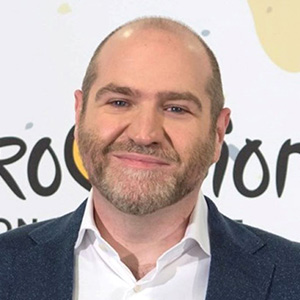“Generation What” Media Lunchtime Talk gives journalists and politicians food for thought from young Europeans
27 April 2017
Exactly one year after the launch of Generation What, the EBU hosted a Media Lunchtime Talk in Brussels on 26 April to give Members involved in the project the possibility to discuss the results with experts and political observers.
Launched in April 2016, the ‘Generation What’-Europe project surveyed one million respondents from 35 countries, with a list of 149 questions in various categories for young Europeans (18-34 year olds). The EBU worked with 18 Member organizations to find out how young people across Europe feel about their lives and the future, politics, immigration, peers, society, and their national identity.
Moderator Paddy O’Connell from the BBC kicked off the discussion by highlighting one of the more prominent survey figures: 82% of young Europeans have no trust in politics and 80% distrust the media. A lively debate followed and showcased how the survey can make a difference in generating social inclusion and bridging the gap between Europe’s older and younger generations.
Hélène Saillon from France Télévisions explained that the origins of the pan-European survey lay in the French ‘Génération Quoi’-project, the first ever survey dedicated to the views of young people. It was built on the commitment of public broadcasters to connect more strongly with younger audiences, and to provide young people what they are looking for.
Saillon believes that public service media needs to develop a digital offer to reach young people where they are: “’Generation What’ is a project of conviction, the story of belief in young people. It is about the way we talk to them, but it’s also a story about friendship because of the great network we created.”
Klaus Unterberger from Austrian Member ORF then spoke about the implementation of ‘Generation What’ in Austria, underscoring that the project is an opportunity to reach out to young audiences. This is an on-going challenge. He disagreed with the moderator’s question as to whether TV is a now a “dinosaur” and mentioned that 84% of young Austrians uses at least one of ORF’s different platforms every day. Perhaps this explains how an ORF radio show around ‘Generation What’ became a huge success and created a vivid tool for dialogue. According to Unterberger, “the views of young people in Europe might be fragmented, but they offer high value societal input.”
Sociologist Maximilian von Schwartz is one of Generation What’s data crunchers. In a presentation outlining the survey’s key output, he showed that young Europeans are more pragmatic than passionate about the European Union (EU). Only 16% of ‘Generation What’ wants their country to leave the EU. The data also shows that young Europeans favour a liberal immigration policy, especially because they believe in the power of immigration to enrich societies. Von Schwarz underlined that the data can be used to make useful comparisons. For instance, there is a link between a country’s youth employment and the extent to which young people trust public institutions.
Responding to comments from the audience, Member of the European Parliament Marie Arena (Belgium, Socialists and Democrats), stated that the old generation in Europe has been more concerned with their individual future whereas the young people in Europe are focused on more collective concerns, such as climate change. Arena stated that a lack of trust in public institutions is not just about corruption, but also about the need for more coherence. The media can play a role in this regard: how will the media work to connect with Europe’s youth?
The panellists agreed that this ‘Generation What’ survey is just the first step on a bigger journey and they hope that the survey will boost a greater commitment to support young people among policy-makers. Dialogue has been opened up and it is important to keep it going, especially now the survey has proven a useful tool to engage with young people.
The talk concluded with an announcement that the ‘Generation What’ survey will also be launched in several Arab countries, followed by an Asian version. The results will be presented at an EBU Asia conference in 2019.
All the results of the ‘Generation What’ -survey can be found here.
Relevant links and documents
Contact

Dave Goodman
Digital and Communications Manager - Eurovision Song Contest and Junior Eurovision Song Contest


